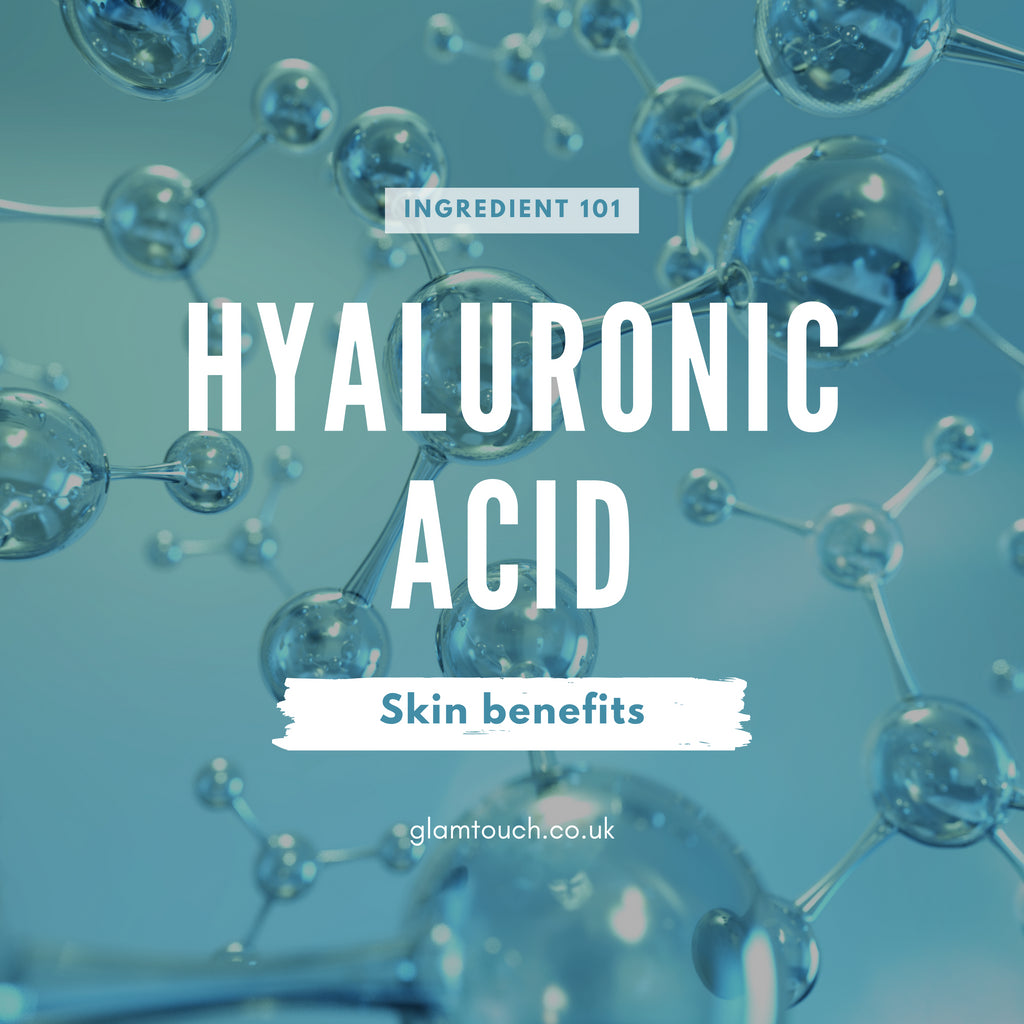Everything You Need To Know About Hyaluronic Acid
Posted by Emma Moseley

Hyaluronic Acid is one of the most widely recognised skincare ingredients used today. The majority of people who use Hyaluronic Acid do so for its excellent moisture retention benefits and lightweight consistency. Here we will share with you all you need to know about Hyaluronic Acid.
What is Hyaluronic Acid?
In plain terms, it is a sugar molecule naturally present in skin. Its primary role is to bind water with collagen to maintain skin’s plumpness below the surface of skin, and to keep skin relatively balanced with enough moisture to function naturally and healthily. As a humectant it is added to skincare products to deeply rehydrate outer dry and inner dehydrated skin. Hyaluronic Acid forms the basis of a large number of anti-aging skincare products, as our skin naturally produces less and less Hyaluronic Acid as we age. Although it is essential for maintaining smooth, sufficiently hydrated skin.
The Benefits of Hyaluronic Acid
Aging, environmental stressors and harsh or inadequate skin care regimes are all factors which contribute to skin’s inability to lock-in moisture and maintain a smooth complexion. Hyaluronic Acid has several benefits which help overcome the negatives associated with said factors:
- Intensive hydrator - prevents moisture/water from ‘escaping’ through the dermis, the epidermis or evaporating from the surface of skin. It is very powerful in the sense that it not only draws in moisture, but it also retains it skin deep.
- Reduces the appearance of fine lines and wrinkles - as Hyaluronic Acid makes use of water molecules, it therefore decreases the likelihood of transepidermal water loss, which would otherwise result in a more pronounced appearance of fine line and wrinkles. The skin deep hydration which comes with Hyaluronic Acid, plump out fine lines and wrinkles.
- Antioxidant properties – this is perhaps the lesser known benefit of Hyaluronic Acid, but it shouldn’t be underestimated. Science backed research shows that HA has a significant impact on reducing oxidative stress on skin. When paired with a high spectrum sunscreen, HA products protect skin from free radicals and inflammatory skin cells.
- Low pH – The pH level of Hyaluronic Acid varies depending on the formulation. Although generally it ranges between mildly acidic and neutral at 5.0 – 8.0 on the pH scale; which is greatly ideal taking into account that this closely matches the natural skin mantle.
Hyaluronic Acid is a universal ingredient. It benefits dry, dehydrated and mature skin types; as well as oiler skin types as it has a water-like consistency and is non-comedogenic. Furthermore, it is fragrance free and has a low pH level, making it a safe and reliable ingredient for sensitive and acne-prone skin types.
The best ways to use Hyaluronic Acid
Hyaluronic Acid needs moisture to fulfil its role. This means that if you apply a Hyaluronic Acid toner, essence, serum, etc. in conditions where humidity is scarce Hyaluronic Acid will intake moisture from wherever possible (often from deeper layers of skin). Consequently, this leaves skin feeling more deprived of moisture than it already was. These are the best practices for incorporating Hyaluronic Acid into your skincare routines:
- Apply Hyaluronic Acid to damp skin – the moist environment provides water molecules for Hyaluronic Acid so that it doesn’t have to source moisture from deeper layers of skin.
- If you live in an environment with low humidity it is a good idea to use a humidifier whenever possible.
- Seal Hyaluronic Acid rich products with a moisturising cream or oil-serum.
- It is safe to use twice daily, morning and evening, unless stated otherwise in the guidelines of the particular product you use.
A big plus with Hyaluronic Acid is that it can pretty much be used alongside any other ingredient. It is encouraged that Retinol be used with Hyaluronic Acid to minimize the irritation and skin dryness which comes with using Retinol. As always, still ensure to follow up with SPF.
Other complementary ingredients: Vitamin C, Vitamin B5 (Panthenol), AHA and BHA.
The best products with Hyaluronic Acid
COSRX Hydrium Triple Hyaluronic Moisture Ampoule – a viscous daily moisturising serum which combines three types of Hyaluronic Acid and Panthenol. It improves skin elasticity and suppleness with long-lasting replenished moisture.
COSRX Hydrium Triple Hyaluronic Moisture Ampoule
COSRX Hydrium Triple Hyaluronic Moisture Cleanser – a dense bubble foam cleanser formulated with COSRX’s signature triple Hyaluronic Acid complex. It gently removes impurities and prevents moisture deprivation.
COSRX Hydrium Triple Hyaluronic Moisture Cleanser
Banobagi Alpha Radiance Serum – a multi-functional brightening and hydrating serum made with Alpha-Arbutin and Hyaluronic Acid. It boosts skin hydration whilst the plant extracts work at correcting different forms of hyperpigmentation.
Banobagi Alpha Radiance Serum
Banobagi Calming Care Moisturising Cream – a gel-cream moisturiser comprised of 10 types of Hyaluronic Acid of differing molecular sizes. It’s sure to provide a surge of moisture to help aid the restoration of the moisture barrier.

Banobagi Calming Care Moisturising Cream
Banobagi Water Glow Booster Mask - This sheet mask with bamboo charcoal is full of hyaluronic acid, which provides hydration and soothing effects to create a glowing complexion.

Banobagi Water Glow Booster Mask
Merbliss Wedding Dress Intensive Hydration Mask – a cellulose sheet mask centered around Hyaluronic Acid to refresh fatigued skin which lack a healthy glow. Best choice for dull, dry and sensitive skin types.

Merbliss Wedding Dress Intensive Hydration Mask
Briskin Real Fit Second Skin Mask (Hydration version) – delivers sufficient moisture to all skin types, plus plenty of antioxidants and anti-inflammatories to ultimately fight against signs of aging.
Briskin Real Fit Second Skin Mask (Hydration version)
Let us know, how do you add some Hyaluronic Acid into your daily routine?



